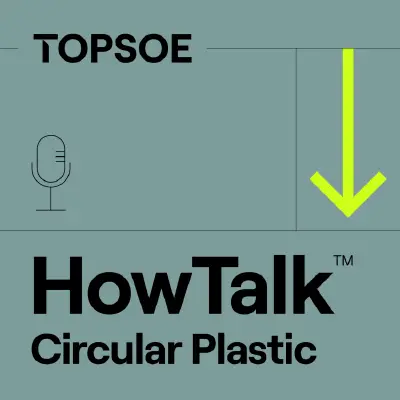
Circular Plastic Podcast
9 episodes Last Updated: Apr 24, 25
This podcast brings you the most recent knowledge and best practices of the circular plastic economy. Topsoe Product Line Director, Milica Folić, is joined by major market players and industry experts to dive into a broad spectrum of circular plastic topics. Together, they will cover latest trends within plastic types, recycling technologies and legislation.
Episodes
Circular business models are essential in tackling plastic waste, shifting the focus from single-use consumption to reusable systems that drive both economic and environmental benefits. But what does that look like in action? Enter the Aarhus case: a large-scale reuse initiative involving the city of Aarhus, TOMRA, Plastic Change, and BCG. Together, they have developed a system to collect, clean, and redistribute reusable cups—one of the biggest pilots of its kind globally.
Inari Seppä, leader of circular advocacy at Eastman Chemical Company, shares Eastman's journey towards sustainability. Discover their innovative carbon and polyester renewal technologies (which convert plastic waste into valuable resources at a molecular level), strategic investments, and ambitious goals for carbon neutrality by 2050.
Valentijn De Neve, CEO of BlueAlp, shares insights on advanced pyrolysis technology, sustainable solutions, regulation, and key industry partnerships. BlueAlp is a trailblazer in the industry, known for its advanced technology and innovative approach. Valentijn will elaborate on BlueAlp’s business model, including their licensing and engineering procurement and key partnerships with major players.
This episode focuses on the ever-evolving landscape of certification systems, a critical component in ensuring the sustainability and traceability of circular plastics. Jan Henke, Director of ISCC System, and Nicola Noponen, who was working as a Standards Director at RSB at the time of the recording, will take us through the intricacies of certification status rules, various certification schemes, and their real-world applications.
To deliver on the goals for the circular plastic economy, we need research to discover new technologies and processes for the effective recycling of plastic waste. This episode brings you a glimpse of the potential future methods for utilizing plastic waste as a resource. Our guest, Kevin Van Geem, shares his and his teams’ latest research on how to make the plastic industry more sustainable. He will cover the usage of steam crackers and pyrolysis, and their discovered challenges associated with using pyrolysis oil instead of e.g., virgin naphtha as steam cracker feedstock.
This episode discloses how mechanical recycling creates a circular pathway for polypropylene back to food-grade applications. Joined by Edward Kosior, Managing Director of Nextek Limited and the NEXTLOOPP project, we uncover the history of mechanical recycling and its breakthrough ways for sorting and decontaminating post-consumer plastic waste.
Legislation is a necessary driver of a circular plastic economy. So, in this episode Milica Folić and guest Sylvan Verdier break down the current legislation on recycled plastic. Europe is frontrunner on plastic recycling and regulation, so the legislation in the EU serves as the starting point for their conversation. Describing the key regulations already in place or being discussed, Milica and Sylvain cover the “full circle” from plastic waste and back to plastic.
Jun 12, 2023
The plastic industry up close! Trends, opportunities, and barriers for the sustainable transition
In this episode, Milica Folić talks to Christof Witte, Partner at McKinsey & Company, about opportunities and barriers for a transition into a more sustainable industry. We take a closer look at the plastic industry today and the trends within plastic types and feedstocks.
Plastic is a brilliant material. Many products can’t be produced without it. For that reason, plastic is not going anywhere anytime soon. Instead, we need to pave the way for a more sustainable production of plastic. In the first episode of the new podcast, Milica Folić and Mikala Grubb from Topsoe, discuss the issues driving the changes to circular plastic. Our aim is to show you the map of the territory, so you can find the best direction for your business.